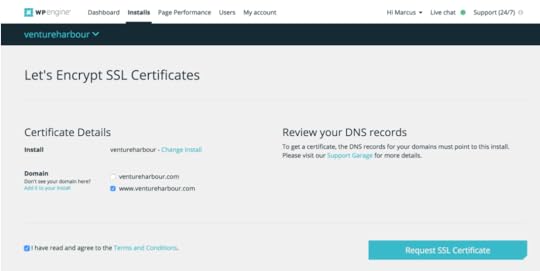WP Engine Review: My Experience Moving 12 Sites to WP Engine
Over the past decade, we’ve used countless web hosting companies at Venture Harbour to host our portfolio of sites; From Bluehost to Media Temple and AWS. In 2016, we decided to migrate 12 of our websites to WP Engine.
In this post, I’ll share why – and our experience so far, including the ups and downs.
TLDR: WP Engine is an impressive web host. While they do have a few quirks that take getting used to, I’d recommend them if you run a WordPress site that gets a decent amount of traffic.
Why we left Media Temple & moved to WP Engine
In 2013, I wrote about migrating VentureHarbour.com to Media Temple after we outgrew the bandwidth limits on our Bluehost server.
While Media Temple weren’t bad, they had a few drawbacks that made us decide to move:
Annoying auto-updates – Media Temple regularly updated our WordPress files without telling us. While this sounds like a good thing, these updates occasionally broke our site. Their auto-updates also included useless plugins and themes that they were trying to promote/sell, causing our server to get bloated.
Declining performance – When we started using Media Temple, our sites were lightening fast. Over time (and particularly following them being acquired by GoDaddy), our server performance went downhill. I’m not sure if we were moved to lower-quality hardware post-acquisition or whether their servers just didn’t scale up properly, but we saw a significant drop in performance.
Slow and buggy auto-migration – Media Temple claim to have a one-click migration service. Unfortunately, it took us over 4 weeks to migrate one site from Bluehost to Media Temple. It turned out that Media Temple’s auto-migration plugin would often skip files, causing incomplete migrations.
So why WP Engine?
In our guide to the best web hosting, we evaluated over 53 different web hosting companies. Out of this list, WP Engine scored exceptionally in a range of areas. Everything from uptime and server hardware quality, to the average time it took their customer support to answer the phone was impressive.
Uptime (%) of different web hosting companies
WP Engine
99.99%
As we use WordPress for the majority of our sites, I decided to migrate VentureHarbour.com to WP Engine as an experiment. If after two weeks we were happy – we would gradually migrate all of our WordPress sites over to WP Engine.
While you know how this story ends – it wasn’t all singing and dancing. Next, I’ll share my first impressions and the pros and cons of WP Engine.
First impressions logging into WP Engine (Video)
When I opened our WP Engine account, I decided to record a short video talking through my first impressions of their platform out loud.
To see a quick walkthrough of WP Engine’s interface, as well as what it’s like when you first open your account with them, watch the video below.
Since recording the video above, we’ve migrated 12 of our sites to WP Engine, and monitored the performance of them for two months.
What I like about WP Engine (Pros)
1. They’re actually good at WordPress hosting
Every web hosting company says that they offer WordPress hosting these days. But no one does it quite like WP Engine.
WP Engine don’t let you install certain WordPress plugins. Why? Because they constantly monitoring the WordPress plugin marketplace to identify plugins that have security loopholes or that put a lot of strain on your database (causing slow loading).
This is how WP Engine are able to guarantee that if your site ever gets hacked, they’ll fix it free of charge. They prevent the likelihood of it happening in the first place.
In addition to this, WP Engine have built-in caching, a built-in CDN (content delivery network), automated daily backups, and much more – to prevent you having to run lots of WordPress plugins that would cause bloat.
They do this in addition to using server hardware and software that is specifically optimised to run WordPress sites. The result? You can rest assured that your site will run fast, with good uptime, and without the risk of it being hacked.
2. WP Engine have the best customer support I’ve ever used
When we used Media Temple, I always thought their customer support was quite good. It was a bit annoying having to remember a PIN to call them, and not having decent live chat, but problems were generally solved quite swiftly.
But WP Engine have since raised my expectations for support sky-high.
When one of our sites was running a bit slower than expected, WP Engine’s support team moved our website to a brand-new higher-spec server free of charge. No downtime, no selling, and no effort on our part. They just got on with it.
When a migration didn’t work out and I clumsily set up the DNS records incorrectly, they told me the exact changes to make, which solved the issue in minutes.
I’ve never had to call up WP Engine’s phone support, as their live chat is so good. We’ve always got a response within less than 2 minutes from a skilled tech support person.
This is what’s going to make it extremely hard to use any other web hosting company.
3. Effortless automated migration (that actually works)
After my experience with Media Temple’s “automated” migration tool, I was extremely skeptical about WP Engine’s automated migration plugin. But I gave it a shot.
I was blown away; It was so easy I migrated four of our sites to WP Engine in about an hour and a half. When I told our CTO about the migrations, he didn’t believe me – so we migrated another site to WP Engine together. It took under 15 minutes.
The first time does take a bit of getting used to, but their plugins just works. Even if you have files outside of the WordPress installation, it seems to (almost magically) copy them across.
Nice touches:
You can choose the location of your server – We decided to host our sites on WP Engine’s UK data centre to be closer to our audience.
Staging sites – While other web hosting companies we’ve used have enabled staging sites (cloned versions of the website to test/build on), they can be time-consuming to set-up. WP Engine have a one-click clone button that creates a staging site. You can then deploy from staging to production in one click from your WordPress dashboard.
Free SSL certificates – With WP Engine you can convert your site to https:// in seconds with a free SSL certificate. For a few of our sites, we actually decided to cancel our paid SSL certificates, as it was easier to just install a free WP Engine one.
Automatic backups (done well) – Most web hosting companies offer daily backups, but there’s usually a catch. Either you can only restore the backups (but not download them to your computer), or the backup happens daily instead of after major updates. With WP Engine, you can download or restore backups. Backups are also taken daily AND before and after all major updates (e.g. updating your WordPress version).
Scheduled pagespeed tests – Another unexpected nice touch is that WP Engine can run weekly or monthly page speed tests on any page you specify. This means you can diagnose when changes to your site cause it to run slower.
Clever user & FTP management – One challenge we’ve had with other web hosting companies is having multiple developers sharing SFTP logins, or ending up with lots of unused FTP accounts. WP Engine allow you to set permissions for control panel access to prevent contractors being able to access sensitive areas like billing. They also allow you to create disposable SFTP logins, making it easy to give different logins to different developers that will expire.
What I don’t like about WP Engine (Cons)
While WP Engine are by far the best overall web hosting company we’ve ever used, they’re not perfect. Below are some of the drawbacks and ‘doh!’ moments we’ve come across using their service.
1. Their biggest strength is also their weakness
What makes WP Engine great is that they just do WordPress hosting.
This can be frustrating. For example, WP Engine don’t offer email hosting. If you want to have an email address for your website, you’ll have to use a separate email host like Google Apps or Zoho Email. Want multiple (non-WordPress) databases? Nope.
If you run a site that has a non-WordPress component (e.g. a software application), you probably won’t be able to run the software part of it on WP Engine (which means you’ll need a separate hosting service like AWS to run it).
For me, this is the biggest drawback with WP Engine. That said, it’s a necessary compromise that (for us) was worth it – as it’s what allows WP Engine to offer such a high-quality WordPress hosting service.
2. The built-in CDN is average
At first, I was really impressed that WP Engine had a built-in content delivery network. As we have a paid account with Cloudflare, I was looking forward to moving our CDN under the same roof as our hosting with WP Engine.
But it didn’t happen. We still use Cloudflare on all of our sites.
WP Engine use NetDNA as their built-in CDN. It’s not as fast as Cloudflare, it doesn’t provide the same level of DDoS protection, and it seems a bit buggy.
When we turned on the CDN the first time, it was ‘on’ in our control panel but seemed to make no difference to our page speed. After contacting support it turned out that it was not actually on. Thankfully, their support team rectified this straight away by turning it on manually.
What happened next was that all of our site’s resources were loaded from a .netdna.com subdomain. This was a bit annoying, as we’d worked hard to reduce the number of DNS lookups our site was making – so we had to manually change all of our resources to be loaded from .ventureharbour.com instead.
In the end we just used Cloudflare.
3. Plans are limited by the number of visits you receive
Our account allows us to run 25 WordPress sites with a total allowance of 400,000 visits per month. While this seems like a lot, that’s an average of 16,000 visits per site per month.
Currently, our sites use about a quarter of this allowance. While understandable, it does make me a little bit nervous that we might be charged overage fees if we suddenly received a spike in traffic.
One positive aspect of this is that WP Engine do not bill you for any bots or non-human visits. As you can see from the screenshot above, this is quite a significant chunk of traffic (over 10% of our visits were non-billable).
Head-to-Head: Media Temple vs. WP Engine
Before we migrated VentureHarbour.com from Media Temple to WP Engine, I recorded our page speed performance, so that we could benchmark whether the migration had improved our performance or not.
Before (Media Temple):
Prior to moving to WP Engine, our web hosting guide took 1.32s to load and had a page performance grade of 90, which is pretty decent.

After (WPEngine):
Immediately after the migration, the same page was now taking 1.22s to load. While not a staggering improvement, it is still a 7.5% improvement on an already very good page speed.

If you’re wondering about the variation in page size, this was due to the hiccup with WP Engine’s content delivery network that I mentioned earlier. In other words, the Media Temple score benefited from a Cloudflare CDN, while the bottom score did not have a working CDN.
Summary: If we went back two months, would we still migrate our sites to WP Engine?
Unsurprisingly, yes.
In the past, I’ve often had buyer’s remorse when choosing a web hosting company. Usually, I come across another web hosting company that offers something better for the same or a lower cost, or a friend tells me an amazing story about a certain web host.
I haven’t had any remorse with WP Engine. In fact, I’m *that* friend that’s been shouting about WP Engine from the proverbial treetops.
While WP Engine is certainly not the cheapest option out there, they’re definitely one of the most cost-effective when you take into account the value of the security and performance features that they offer as standard.
So who would I recommend WP Engine to – and more importantly, who wouldn’t I recommend it to?
I would recommend WP Engine if: You have a WordPress site (or collection of sites) that receive decent traffic (more than 10,000 visits / month) and that you critically need to keep online and not get hacked.
I would not recommend WP Engine if: You’re a beginner looking to host a low-traffic / side-project website (it’s probably overkill for that – save your money and use Bluehost instead). Obviously, if you’re not using WordPress this isn’t going to be right for you.
I hope this evaluation has been useful to you. If you have experience with WP Engine, I’d love to hear your thoughts in the comments below – otherwise, if you want to get started with them you can do so by going to https://wpengine.com.
Update: WP Engine have kindly offered a 20% discount to Venture Harbour readers on their first month if you go through this link. You can also get two months free by choosing an annual plan. For full disclosure, we do get paid a commission – but this comes out of WP Engine’s pocket and not yours.
The post WP Engine Review: My Experience Moving 12 Sites to WP Engine appeared first on Venture Harbour.









